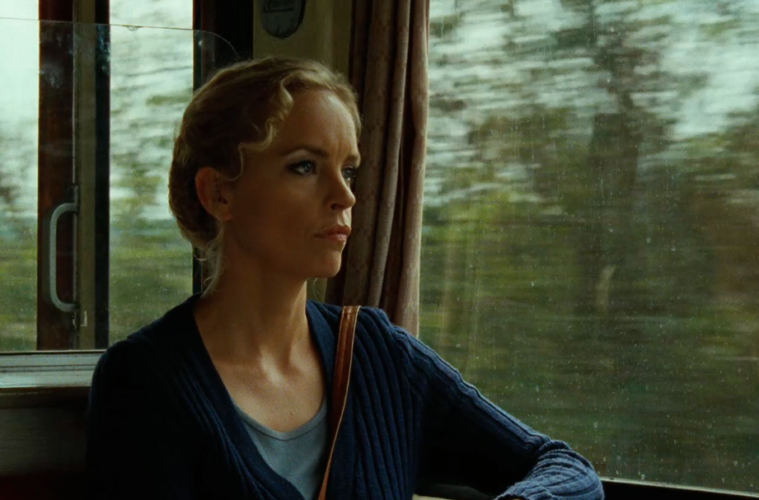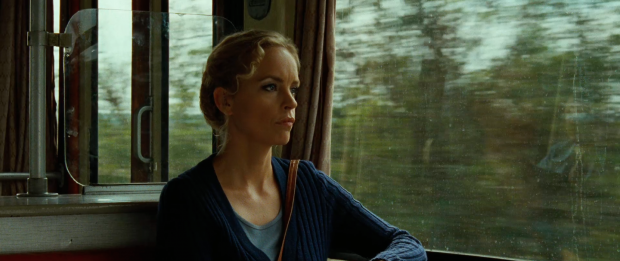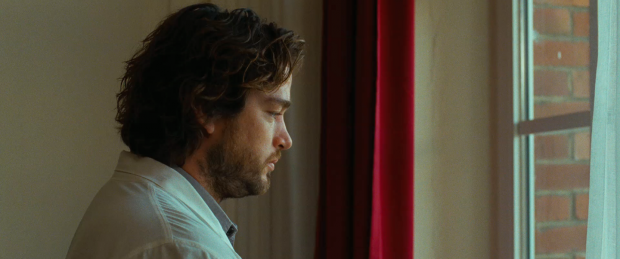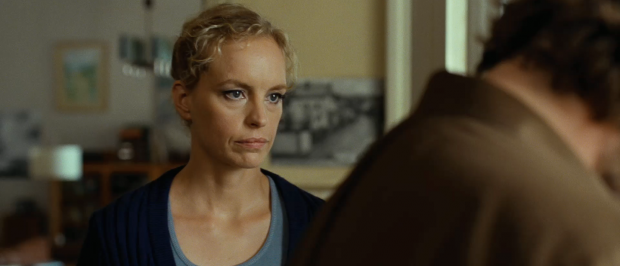One of the most finely restrained films I saw at this year’s New York Film Festival was Christian Petzold‘s Barbara, a wisely subtle, meticulously patient character drama about a woman named Barbara (Nina Hoss) who, after trying to escape the German Democratic Republic, finds herself banished to a small village in East Germany, where she must work in a hospital under the tutelage of chief physician André (Ronald Zehrfeld). The film’s a well-acted, quietly gorgeous rendering of this tension-filled era — something that comes as a pleasant, welcome surprise, seeing as how Barbara is Petzold‘s first period piece to date. It didn’t come as much of a shock, then, when Petzold revealed that his interest in this story first grew from his own personal experience.
“My parents were from the GDR,” Petzold told me during our one-on-one sit-down. “But they eventually fled and became refugees. So while each of them had this whole experience with the GDR, they never much talked about it. My knowledge of it was limited. But visiting the GDR recently, while shooting my last few films, there were feelings for it that came back. I suddenly had the urge to go there and make a film, to try and meet a place I’ve never fully come to understand.”
This dynamic — which is clearly a very close-to-home one for Petzold — comes through vividly in the film, chiefly through the stunning, often bravely stoic lead performance of Nina Hoss. Her character, fiercely torn between the two worlds of East and West Germany, has an outsider-like quality that isn’t entirely at odds with the one Petzold himself felt. The more immediately appealing of Barbara’s two options is to flee to the West with her handsome lover (Mark Waschke), where she’d presumably lead a wealthy, stress-free lifestyle. While she finds emotional rewards at the hospital through intimate interactions with patients (Jasna Fritzi Bauer, Jannik Schümann), her criminal past keeps her under constant surveillance from Stasi officers whose presence makes it impossible for her to relax.
One of the methods Petzold implemented to imbue the film with this very sense of mounting paranoia was the decision to shoot chronologically. “Filming chronologically is usually not a realistic option, because it’s such an expensive process,” he said. “But it was extremely important for me here because the central relationship between Barbara and André needed to work. It had to grow and develop through the actors — they had to feel the emotional progress of it, and then communicate it to the audience.”
This is indeed something that shines through in Barbara and even, perhaps, comes to define it. So much of “the film douses itself in an atmosphere of restrained mysteriousness,” I wrote in my review, meaning that the love-story dynamic between Barbara and André, much by design, isn’t something that immediately calls attention to itself as an obvious possibility. Because Petzold‘s calm camera and autumn-flavored period design do such a fine job of burying us in this 1980 environment — and, specifically, Barbara’s anxiety therein — it doesn’t seem likely, at the film’s outset, that Barbara’s story has the potential to end in a sugar-sweet fashion. But the more time Hoss and Zehrfeld spend together, the more they seem like a picture-perfect match.
Zehrfeld‘s performance, which has tended to be unjustly sidelined by critics in favor of Hoss‘s, has a lot to do with that. “I really loved working with him,” Petzold said of Hoss‘s warm-looking co-star, whose inviting, bearded grace sometimes makes him out to be a mature father figure. “He and Nina both understood this intention of having their characters fall for each other through work, through their jobs. They rarely have time during the film to step outside of their professional box and discuss personal things, but that doesn’t matter. It’s the work that brings them together.” And Petzold was sure to contrast this portrait with the one he paints of Waschke‘s Jörg, Barbara’s other potential love interest. “He’s quite a superficial guy, when you compare him to André. Their relationship seems more like a love one would find in a catalogue. It would have trouble lasting, I think.”
Of course, a lot of the burden of these personal strains ultimately falls on Hoss‘s shoulders, which is a fascinating task for the actress, since the recurrent presence of the Stasi officers often forces her character into a state of outward indifference. It’s a measure of Hoss‘s ability that she’s able to convey so many inner demons while still maintaining a chain-smoking allure of external control and composure. And, even though they’ve now collaborated on a handful of accomplished projects, Petzold is quick to give Hoss her own singular, standalone credit. “We have a great working relationship,” he said. “But she still remains somewhat separate from me, which is perhaps what continues to draw me back. Perhaps it’s the female emphasis that she brings, a point-of-view that I naturally can’t completely explain and grasp.”
When I ask him if the process of Barbara introduced anything new into their director-actress collaboration, he smiles coyly, and then is extremely careful about how he words his response. “I would perhaps not mention this if Nina were here today,” he says, letting out a laugh. “But she is getting on in years. It’s starting to show a bit. But it’s showing in a fantastic, revealing way. She’s becoming a new person, a more interesting person. I think, and hope, that we will continue to work together for several more years.” And it’s a testament of how intimately Petzold captures Hoss‘s expressions in the film that I understand completely what he means — this story, in particular, calls for a woman of seasoned maturity, and the slight wrinkles we can gauge on the face of Hoss‘s Barbara as she drags on a cigarette only enhances the film’s dramatic intrigue. And, as anyone with a pair of functioning eyes can tell, she’s still threateningly gorgeous.
I’m hardly taken aback, then, when Petzold tells me his next film will star Hoss as well. “It takes place in Berlin,” he says of the upcoming project, “in 1945. It’s about a woman who survived Auschwitz and now wants to get her life back. I’m excited to be doing another historical film, and to be working with Nina again. We’re still finalizing some of the financial support, but I’m optimistic that we’ll be underway soon.” Barbara, which begins a well-deserved limited release this weekend, is yet another piece of ample evidence that any future Petzold–Hoss collaboration can never get here soon enough.
Barbara is now in limited release and one can find more info here where to see it.




